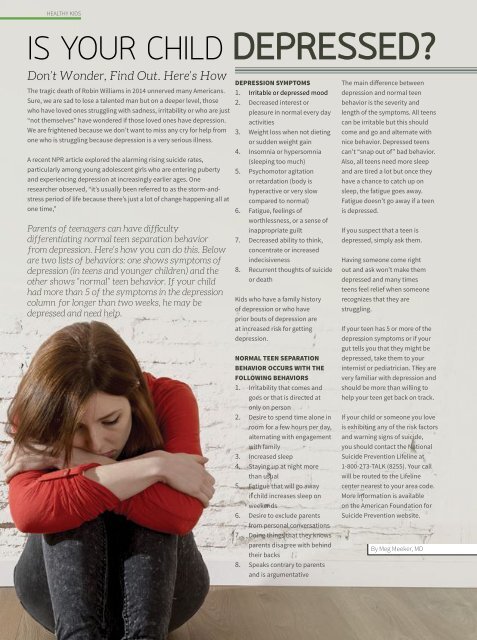NOVEMBER 2016 MIAMI for web
Create successful ePaper yourself
Turn your PDF publications into a flip-book with our unique Google optimized e-Paper software.
HEALTHY KIDS<br />
IS YOUR CHILD DEPRESSED?<br />
Don’t Wonder, Find Out. Here’s How<br />
The tragic death of Robin Williams in 2014 unnerved many Americans.<br />
Sure, we are sad to lose a talented man but on a deeper level, those<br />
who have loved ones struggling with sadness, irritability or who are just<br />
“not themselves” have wondered if those loved ones have depression.<br />
We are frightened because we don’t want to miss any cry <strong>for</strong> help from<br />
one who is struggling because depression is a very serious illness.<br />
A recent NPR article explored the alarming rising suicide rates,<br />
particularly among young adolescent girls who are entering puberty<br />
and experiencing depression at increasingly earlier ages. One<br />
researcher observed, “it’s usually been referred to as the storm-andstress<br />
period of life because there’s just a lot of change happening all at<br />
one time,”<br />
Parents of teenagers can have difficulty<br />
differentiating normal teen separation behavior<br />
from depression. Here’s how you can do this. Below<br />
are two lists of behaviors: one shows symptoms of<br />
depression (in teens and younger children) and the<br />
other shows “normal” teen behavior. If your child<br />
had more than 5 of the symptoms in the depression<br />
column <strong>for</strong> longer than two weeks, he may be<br />
depressed and need help.<br />
DEPRESSION SYMPTOMS<br />
1. Irritable or depressed mood<br />
2. Decreased interest or<br />
pleasure in normal every day<br />
activities<br />
3. Weight loss when not dieting<br />
or sudden weight gain<br />
4. Insomnia or hypersomnia<br />
(sleeping too much)<br />
5. Psychomotor agitation<br />
or retardation (body is<br />
hyperactive or very slow<br />
compared to normal)<br />
6. Fatigue, feelings of<br />
worthlessness, or a sense of<br />
inappropriate guilt<br />
7. Decreased ability to think,<br />
concentrate or increased<br />
indecisiveness<br />
8. Recurrent thoughts of suicide<br />
or death<br />
Kids who have a family history<br />
of depression or who have<br />
prior bouts of depression are<br />
at increased risk <strong>for</strong> getting<br />
depression.<br />
NORMAL TEEN SEPARATION<br />
BEHAVIOR OCCURS WITH THE<br />
FOLLOWING BEHAVIORS<br />
1. Irritability that comes and<br />
goes or that is directed at<br />
only on person<br />
2. Desire to spend time alone in<br />
room <strong>for</strong> a few hours per day,<br />
alternating with engagement<br />
with family<br />
3. Increased sleep<br />
4. Staying up at night more<br />
than usual<br />
5. Fatigue that will go away<br />
if child increases sleep on<br />
weekends<br />
6. Desire to exclude parents<br />
from personal conversations<br />
7. Doing things that they knows<br />
parents disagree with behind<br />
their backs<br />
8. Speaks contrary to parents<br />
and is argumentative<br />
The main difference between<br />
depression and normal teen<br />
behavior is the severity and<br />
length of the symptoms. All teens<br />
can be irritable but this should<br />
come and go and alternate with<br />
nice behavior. Depressed teens<br />
can’t “snap out of” bad behavior.<br />
Also, all teens need more sleep<br />
and are tired a lot but once they<br />
have a chance to catch up on<br />
sleep, the fatigue goes away.<br />
Fatigue doesn’t go away if a teen<br />
is depressed.<br />
If you suspect that a teen is<br />
depressed, simply ask them.<br />
Having someone come right<br />
out and ask won’t make them<br />
depressed and many times<br />
teens feel relief when someone<br />
recognizes that they are<br />
struggling.<br />
If your teen has 5 or more of the<br />
depression symptoms or if your<br />
gut tells you that they might be<br />
depressed, take them to your<br />
internist or pediatrician. They are<br />
very familiar with depression and<br />
should be more than willing to<br />
help your teen get back on track.<br />
If your child or someone you love<br />
is exhibiting any of the risk factors<br />
and warning signs of suicide,<br />
you should contact the National<br />
Suicide Prevention Lifeline at<br />
1-800-273-TALK (8255). Your call<br />
will be routed to the Lifeline<br />
center nearest to your area code.<br />
More in<strong>for</strong>mation is available<br />
on the American Foundation <strong>for</strong><br />
Suicide Prevention <strong>web</strong>site.<br />
By Meg Meeker, MD<br />
8 / HEALTHY <strong>MIAMI</strong>
















